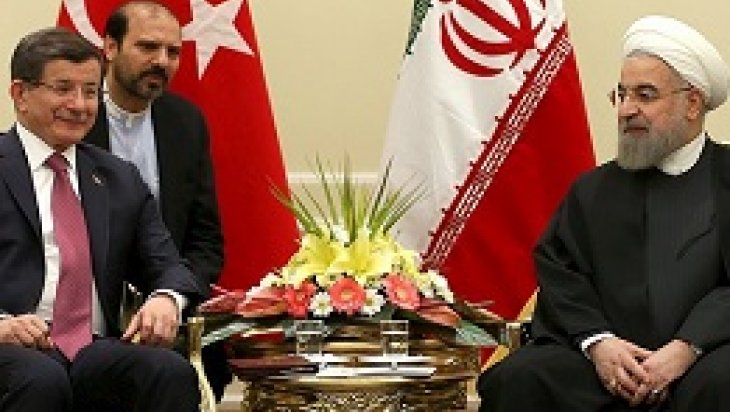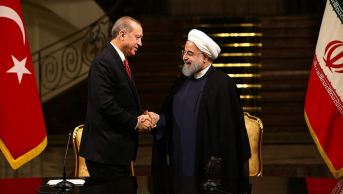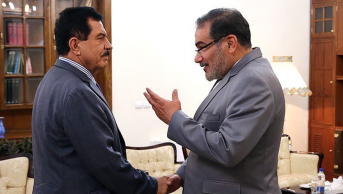PM Davutoğlu’s Visit to Tehran: A New Momentum in Turkey-Iran Relations

Prime Minister Ahmet Davutoğlu paid an official visit to Tehran on March 4-5, 2016. Bilateral relations, economic cooperation and the regional developments were set at the agenda of the visit. Although the parties could not recover their differences on the regional developments, the visit gave a new momentum to Turkey-Iran relations.
‘Iranian Spring’ and Turkey-Iran Relations
In the aftermath of the diplomatic solution of the nuclear controversy between Iran and the West in July 2015, the season in Tehran turned to ‘spring.’ Many delegations including businessmen and policymakers from different corners of the world, but led by the Western European countries, have flowed into Tehran in order to assess investment opportunities in Iran after the nuclear deal. In return, in order to make use of the positive environment that has been ensued by the nuclear deal, for their political and economic interests Iranian high-level officials visited many countries.
Ironically, against the springtime between Iran and the West, the relations between Ankara and Tehran cooled off. Turkey was optimistic, but cautious with regard to the nuclear deal. Ankara asked Tehran to perform its credential in ‘constructive diplomacy’ with related to the regional issues and to revise its policies towards the Middle East. Iranian Foreign Minister Javad Zarif’s visit to Ankara due in August 2015, cancelled at last minute. Turkey showed ‘strategic patience’, with the words of a Turkish official, in the face of allegedly aggressive policies of Iran in the region, particularly in Syria, in cooperation with Russia. In the meantime, Iranian and Turkish officials uttered strong statements against each other. However, Turkey was one of the few countries that supported Iranian nuclear program for a long while, and was against the isolation of Iran through sanctions. Notwithstanding the previous Turkish support for Iran, the reasons for the cooling off relations between Ankara and Tehran could be analyzed under three groups. First is the publication of baseless claims against Turkey, particularly targeting President Erdoğan and his family by the official or semi-official media in Iran. Second is the election process in Turkey that led it focus in internal affairs. Third reason is stemmed from the adverse effects of recent regional developments.
Despite the cooling off relations between Ankara and Tehran, Turkish businessmen and merchants turned towards Iran. The removal of sanctions over Iran as part of the nuclear deal made Iran very attractive for Turkish businessmen and merchants who have lost their markets in some regional countries, including Russia. In addition to small and medium-sized enterprises, Turkish conglomerates united under the umbrella of TUSİAD have also interested in Iranian markets. Recently, a delegation of Turkish businessmen led by Rifat Hisarcıklığolu, head of the Union of Chambers and Commodity Exchanges of Turkey, visited Tehran and sought ways for enhancing economic cooperation between the two countries.
A New Momentum in Bilateral Relations
The visit of Davutoğlu could be viewed as a reinstatement of bilateral relations after a decline in the last couple of months. Additionally, it gave a new momentum to bilateral relations between the two countries both politically and economically. The consolidation of the power of acting governments under PM Davutoğlu and President Rouhani after recent elections held in Turkey and Iran will help further this impetus.
The Joint Turkish-Iranian Economic Commission will be met in Turkey in the next couple of months. President Rouhani will visit Turkey in June and the third round of the High Level Cooperation Council will meet in Ankara. The parties are expected to review the state of bilateral relations and sign new cooperation agreements at the meeting.
Davutoğlu attributed the failure in achieving the target of 30-billion dollar worth of economic transactions between the two countries to the adverse effects of sanctions. Then, he called the removal of sanctions a golden opportunity to further Turkey-Iran relations. The two countries are expected to increase their cooperation energy including oil and gas, finance, and tourism. Additionally the parties decided to integrate their railway networks, and connect highways and harbors in Iran and Turkey. They are also resolved to reach the worth of bilateral trade to the level of 30-billion dollar within the three years.
In addition to the measures to be taken by the respective governments such as investments in infrastructure, Turkish and Iranian government from now on expect the involvement of private sector in order to deepen and expand bilateral relations. Therefore, around 160 businessmen accompanied Davutoğlu at the visit; and Turkish-Iranian Business Forum was held on March 5, in Tehran. In order to promote bilateral trade and economic relations, Turkey will open Turkish Trade Center in Tehran in the coming months.
Currently, the amount of Turkish exports to Iran is around 3,6 billion dollars. It is reported that about 200 Turkish companies are active in Iran and have investment worth of 2,1 billion dollars. Turkish companies who have already a remarkable place in textile and clothes, are expected to invest in shopping malls, oil refineries, energy, construction, hotel, highway, railway and automotive.
Additionally, the visit led to the revival of security cooperation between the two countries. Joint security committees that were established in late 1990s did not met in the last couple of years, which was partly responsible for growing suspicion between the parties on security issues.
Regional disagreements remain
In fact, disagreements between the two countries on the regional issues are not novel. Moreover, Turkey and Iran achieved to improve their bilateral relations despite their differences on regional matters. The two countries agreed to establish High Level Cooperation Council and invoked preferential trade agreement in the last two years. Finally, President Erdoğan visited Tehran in April 2015. It has been facilitated by an implicit understanding between Turkey and Iran that prevailed over 15 years to keep bilateral relations immune – as possible as it is – from regional disagreements.
That is why Davutoğlu, on his way to Tehran stated that disagreements between the countries on regional issues are quite natural, but the lack of interaction is unusual. Indeed, interactions and contacts between the countries help to manage their differences and find out shared concerns along with common interests.
As it is well known, the most serious regional difference between Turkey and Iran is over Syria, particularly over the fate of President Assad. The two countries are also at odds with each other over the crises in Iraq, Lebanon, and Yemen, and with regards to relations with Saudi Arabia. Distressed with regional position of Iran, Turkey has accused Iranian government of attempting to expand its sphere of influence in the region through sectarian policies. In return, Iran has blamed Turkey for supporting extremist movements in Syria. Recently, the growing relations between Turkey and Saudi Arabia made Iran anxious.
Despite the regional differences between the two countries, Davutoğlu and his collocutors in Tehran confirmed shared concerns and common interests, and underlined the importance of regional cooperation between the two countries. As stated clearly by Davutoğlu, one of the common viewpoints between Ankara and Tehran is regional solutions for regional problems. Both Turkey and Iran are distressed with the lessening of their role particularly in Syria, now dominated by the United States and Russia. Recent rumors and debates about the ‘Plan B’ that foresaw partition of Syria fueled the concerns of both Turkey and Iran. That is why Davutoğlu publicly stated they “should not leave the fate of the region to extra-regional powers.” Additionally, the two countries shared their concerns with regard to the territorial integrity of Syria. In this regard, Turkey and Iran could take some initiative in search of regional solutions for regional problems.
Additionally, the new momentum in Turkey-Iran relations that begin with Davutoğlu’s visit to Tehran will help allay Iran’s uneasiness with Turkish-Saudi rapprochement. The polarization between Iran and Saudi Arabia fuels the tension in the region and makes solution attempts inconclusive. The reinstatement of trust between Iran and Turkey, may facilitate the latter’s possible mediation on this issue.
The momentum given to Turkey-Iran relations, of course, does not mean to overcome regional differences between the two countries. While Davutoğlu was in Tehran, Turkish Foreign Minister Mevlüt Çavuşoğlu addressed the Turkish parliament on the occasion of the review of budget of his ministry, where he stated: “Iran is our brother, yet we can criticize its wrongdoings. ... we are against sectarian policies of Iran.”











